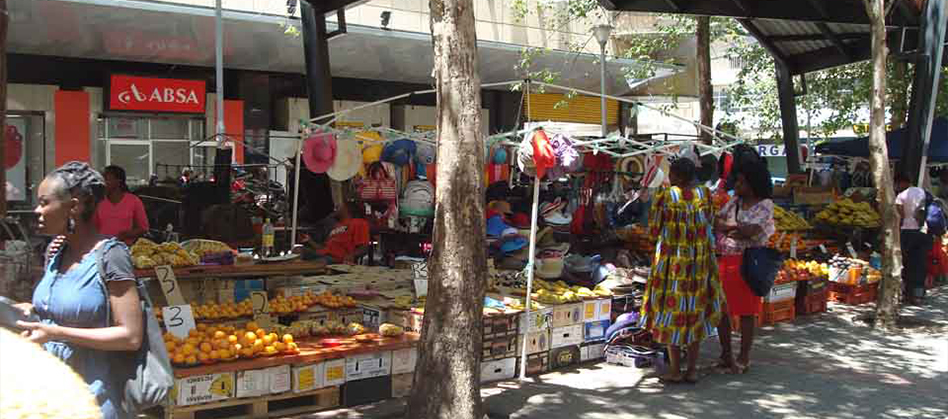
Why Removing Informal Trade is a Bad Idea
The inner city of Johannesburg has experienced a (mostly illegal) raiding of informal traders over the past week, with police misconduct rampant for a few weeks. Some attribute it to Mayor Parks Tau’s desire for a “cleaner” city. Here is why I am so upset that the streets I have lived and walked on over the past 3 years are currently mostly empty of informal trade.
1. City Identity Enough with the “World Class City.” There is no such thing. What makes a city is its own unique identity, and in my eyes, Johannesburg’s identity is one of heart, hustle, vibrancy, and ubuntu. Informal trade directly reflects this identity. Removing street trade in order to look like London or New York is removing the essence and heart of the city that many locals and foreigners love. (Side note, there is comparable informal trade in New York, London, and most international cities as well, its just in the areas you don’t always see on TV).
2. Livelihoods Johannesburg has an unemployment level of 40%. 40%! And that number likely doesn’t include the many undocumented immigrants. To combat this in the face of slow formal job creation, people turn to their own skills and entrepreneurship, utilising the informal economy. It’s not that informal traders don’t want a job, are not qualified for a job, or are not looking for one. Rather those in the informal economy refuse to let the country’s inability to create jobs quickly stop them from living their life and feeding their families. Congrats JMPD, through your raids, you have successfully fired thousands of people from their livelihoods.
3. Accessible, Affordable Goods By the time I got home from work last night, all the stores were closed (aside from our 24 hour Spar, which has overpriced, poor-quality vegetables). I wanted to cook a salad and vegetables. The traders I usually buy from weren’t there. I am not the only one in this situation. It’s simple: street vegetables and fruit are better quality, cheaper, and quicker and easier to buy than in a store. Who doesn’t want that in their city?
4. Safety & Security In my view, informal traders are one of the best weapons Johannesburg has against crime. If there’s a trader on my walk to wherever I am going, I know I am less likely to be robbed, because someone is watching. Last night, the street traders that usually make me feel safer walking to Spar after dark weren’t there, offering another level of discomfort going to Spar for my overpriced, poor-quality vegetables.
5. Community Those traders that offer safety through their mere existence as an extra set of eyes, also know me and care about my safety. We know each other’s names, we know about each other’s families, we build a community in the blocks around where we stay and trade. I haven’t seen a little girl who’s mom trades near the basketball court since I returned from New York, because her mom’s stock was raided and she can’t afford to buy new goods to start over again. I don’t know when I’ll be able to give Xoliswa her colouring book from New York, and I know that she is missing basketball practice with Denzel and Moses.
6. Dignity This one is simple. A person is making a living, not asking for hand-outs, help, anything. A police officer comes in, yells at them, throws around their goods and makeshift structures that have often taken years to source material and build, confiscates their goods, yells at the person not to talk back, and leaves the person with nothing. No one deserves this.
7. Legality On top of the dignity piece, JMPD have acted 100% illegally, not issuing tickets for the traders’ “offences” (often because there weren’t any), seizing goods from traders who have purchased permits to trade, and acting entirely disrespectfully.
I don’t know what I can do about this, but I do know one thing, I am not happy. A city without informal trade is not the city I fell in love with.
